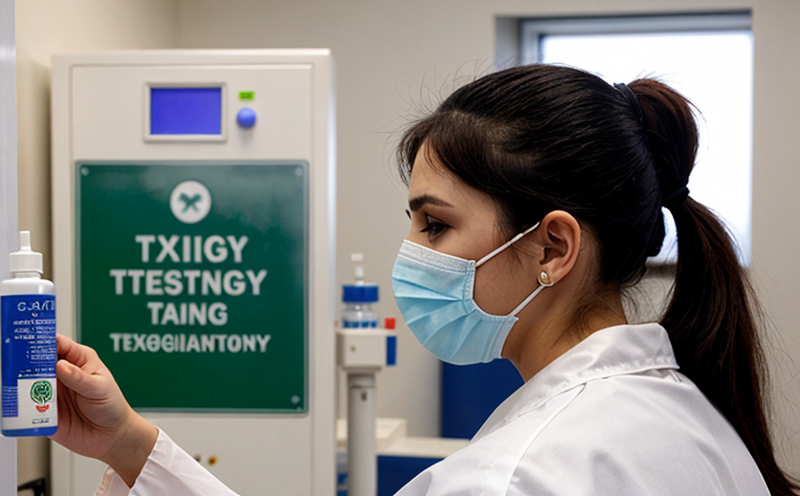Organ Toxicity Kidney Function Biomarkers Testing
The testing of organ toxicity and kidney function biomarkers is a critical aspect within pharmaceutical development. This service ensures that new drug candidates are evaluated for their potential to cause adverse effects on the kidneys, which can have significant implications for patient safety and regulatory approval.
Our comprehensive approach involves assessing multiple biomarkers indicative of renal impairment. These include creatinine clearance rates, blood urea nitrogen (BUN), uric acid levels, and several other parameters that reflect kidney function. The tests are conducted using state-of-the-art instrumentation to ensure precision and reliability in our findings.
Our laboratory adheres strictly to international standards such as ISO 17025 for quality assurance and is accredited by leading regulatory bodies like the United States Food and Drug Administration (FDA) and the European Medicines Agency (EMA). This ensures that all tests meet stringent criteria, providing you with accurate and reliable results.
The testing process begins with thorough specimen preparation. Samples are collected from subjects undergoing clinical trials or post-market surveillance studies. These samples undergo rigorous quality checks to ensure they meet specific acceptance criteria before analysis can commence. The use of advanced analytical techniques allows us to detect even minor changes in biomarkers, providing early indications of potential issues.
Once the specimens have been prepared and analyzed, our team generates detailed reports that provide comprehensive insights into any detected abnormalities. These reports are essential for guiding further research or adjusting clinical protocols as necessary. By leveraging this data, pharmaceutical companies can make informed decisions about the safety profile of their products during various stages of development.
Our expertise lies not only in conducting these tests but also in interpreting the results accurately and providing actionable recommendations based on our findings. This collaborative approach ensures that both regulatory compliance and patient well-being are prioritized throughout every phase of drug testing.
Scope and Methodology
| Biomarker | Test Description | Acceptance Criteria |
|---|---|---|
| Creatinine Clearance Rate | Determines the glomerular filtration rate by measuring creatinine levels in urine over a specific period. | Average value within ±10% of reference range. |
| Blood Urea Nitrogen (BUN) | Measures nitrogen waste products present in blood serum. | Ranges between 7-20 mg/dL based on age and gender. |
| Uric Acid Levels | Detects excess uric acid production or excretion which may indicate impaired kidney function. | Limits set according to individual patient characteristics. |
| Nitrogen Renal Function Markers | Assesses overall renal health by examining specific proteins and enzymes involved in nitrogen metabolism. | Values align with established clinical guidelines for normal renal function. |
The methodology employed is aligned with international standards including ISO 17025, ASTM E1694-18, and EN ISO/IEC 17025:2017 ensuring consistency and accuracy in all our procedures.
Quality and Reliability Assurance
We maintain a robust quality management system that is compliant with international standards. Our team undergoes continuous training to stay abreast of the latest developments in toxicology testing methods and best practices. Regular audits ensure adherence to these high standards.
The reliability of our results is further enhanced through strict quality control measures at every stage of sample handling, analysis, and reporting. We utilize cutting-edge technology to minimize errors while maintaining precision and accuracy throughout each step.
Our commitment to excellence extends beyond just technical proficiency; we prioritize clear communication with clients regarding expectations, timelines, and expected outcomes from our services. This transparency fosters trust between us and our partners who rely on accurate data for critical decisions impacting public health.
Customer Impact and Satisfaction
The success of our service is measured by the satisfaction levels of our clients. We strive to provide timely, reliable, and insightful reports that contribute positively towards their regulatory compliance efforts and product development strategies.
Our collaborative approach ensures that all stakeholders involved in pharmaceutical testing receive personalized attention and support tailored specifically to meet individual needs. By offering detailed explanations alongside our findings, we empower decision-makers with the information they need to move forward confidently.
Client feedback is highly valued by us as it helps shape continuous improvement initiatives aimed at enhancing service quality further. Through regular communication channels, we encourage ongoing dialogue which allows for mutual understanding and alignment on goals.





